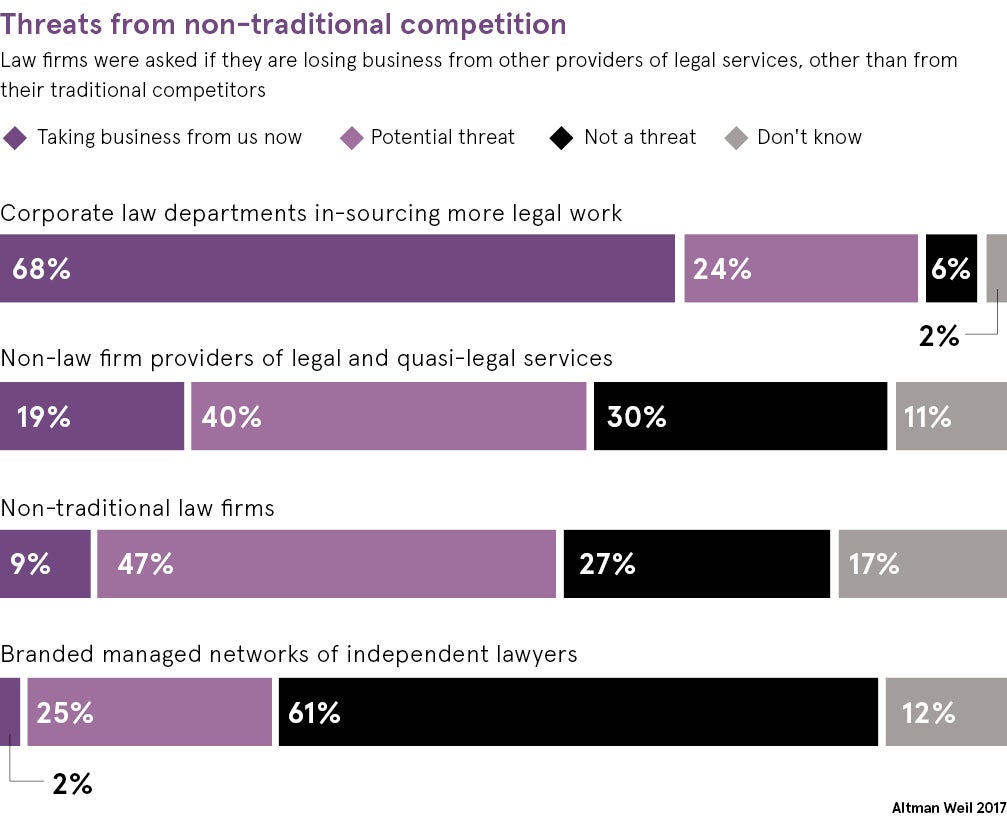In-house legal teams are causing law firms a headache. With businesses facing more legal facets, the cost-savings and assurances of having in-house counsel are, for many, a better option than instructing external lawyers who charge hefty fees for carrying out day-to-day legal affairs.
Through their tighter integration with a company’s operational leaders, general counsel (GC) can fill a broader remit. Their legal knowledge can be leveraged to help transform an organisation beyond restructurings, such as supporting strategies to change business models and acting in a more commercial capacity.
“GCs tend to be business minded and outcome focused, driven by commerce and results,” says Rhiannon Cambrook-Woods, managing director at legal recruitment firm Zest Recruitment and Consultancy LLP. “They are determined to get things right for their employer and are very mindful of managing costs.”
Jochen Kasper, vice president and legal counsel Europe, Middle East and Africa for software firm Infor, adds: “As a prerequisite to successfully support the operational structures, in-house legal departments need to work closely with the business leaders and understand their visions and strategies. They are part of the definition of such strategies.”
The ability of legal departments to align with the strategic goals of their business has evolved the role of GCs beyond just managing risk. They typically have a blend of legal and non-legal skills, and often look at how legal technology and innovative processes can add more value to the company they work for.

As opposed to external firms, which are naturally driven by their own targets, GCs are entirely dedicated to the company’s goals and can act as an internal integrator. With more knowledge of the business, an internal team can demonstrate more internal value and acts as a real company representative.
“While law firms focus on legal problems, internal legal resources concentrate on providing solutions that fit both from a legal perspective and a commercial perspective,” says Mr Kasper. “It is the combination of the legal and commercial understanding of the business case that allows the internal legal function to be more innovative than an external attorney.”
Becoming a partner at a top firm was always viewed as the pinnacle of the legal profession. However, with C-suite directors from other sectors increasingly keen to recruit lawyers into important roles, lawyers in private practice are recognising other avenues for success. “GCs who can communicate, operate pragmatically and behave commercially have been rightly catapulted into prominent business roles,” says Matt Meyer, chief executive at law firm Taylor Vinters.
With the work-life balance of a GC also considered far better than that of somebody working in a private law practice, legal firms are facing the tough task of keeping the best talent on their side.
The number of in-house lawyers doubled between 2000 and 2012, and the portion of all practising solicitors working in–house grew from 16 per cent in 2001 to 22 per cent in 2016, according to analysis from the Law Society. This can be attributed not only to more demand across sectors for GCs, but also an emerging perception that such a role can offer a better variety of work and quality of life.
It may not be long until graduate lawyers jump ship and chase career growth within a legal department
To most graduates, spending the early stages of their career in private practice is still viewed as necessary to forming a successful legal career. The opportunity to develop skills across a range of client environments with the law firm structure remains the highest regarded entry route for a lawyer. But it may not be long until they jump ship and chase career growth within a legal department.
“Law firms are not necessarily known for their flexibility, work-life balance or attractive benefits package, but in-house can often attract all of these things and more,” says Ms Cambrook-Woods. “Aside from developing a strong commercial awareness, in-house lawyers often report that in any given week they could be advising on employment law, personal injury, commercial law or copyright law.”
The opportunity to have board-level influence acts as a further draw, according to Mr Meyer. “Couple that with meaningful remuneration, capital opportunities through options, and the ability to work internationally and across sectors, and you have an attractive option,” he says.
Private practices still employ three in five lawyers, according to the Law Society, but attracting and retaining the best and brightest talent, amid competition from both competing law firms and other sectors, is now more difficult.
In this landscape, law firms are realising they need to examine their treatment of employees. Holiday allowances have historically been poor in the legal profession, but Douglas Scott Legal Recruitment’s most recent salary and benefits study found that 54 per cent of employees now benefit from above the statutory allowance compared with 47 per cent last year and only 35 per cent in 2016.
“For the first time ever, over half of legal professionals are helping strike a better work-life balance with an enhanced holiday allowance,” says Kathryn Riley, Douglas Scott’s managing director. “If an employer is selling themselves as a nimble and dynamic legal business, they need to move with the times.”
While technologies such as artificial intelligence will automate some legal processes, success in the industry will continue to rely on having the best people. With an increasingly competitive landscape and the growing lure of in-house legal departments, law firms can no longer count on prestige only when recruiting talent – building a culture befitting of the millennial generation is paramount.

